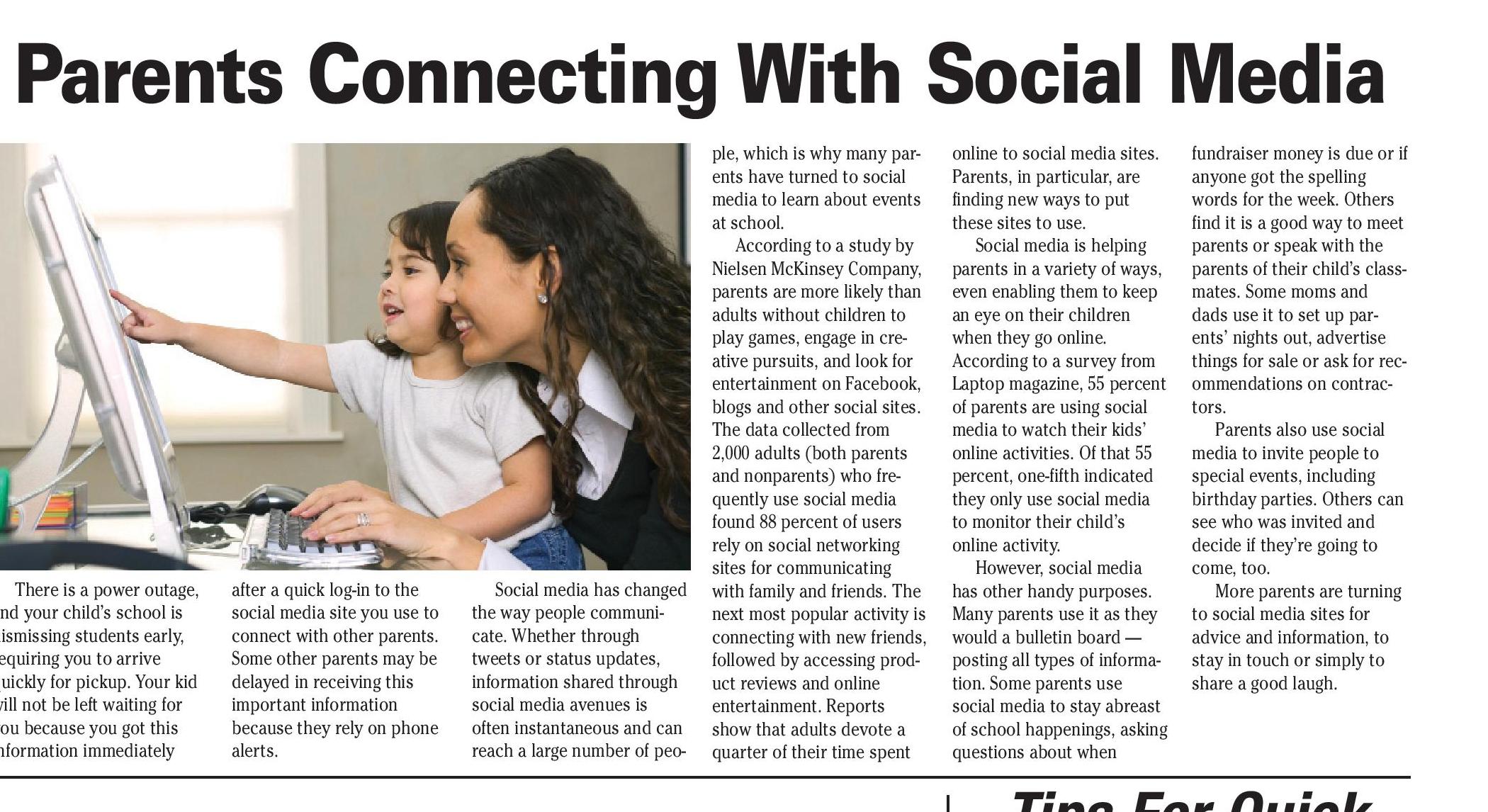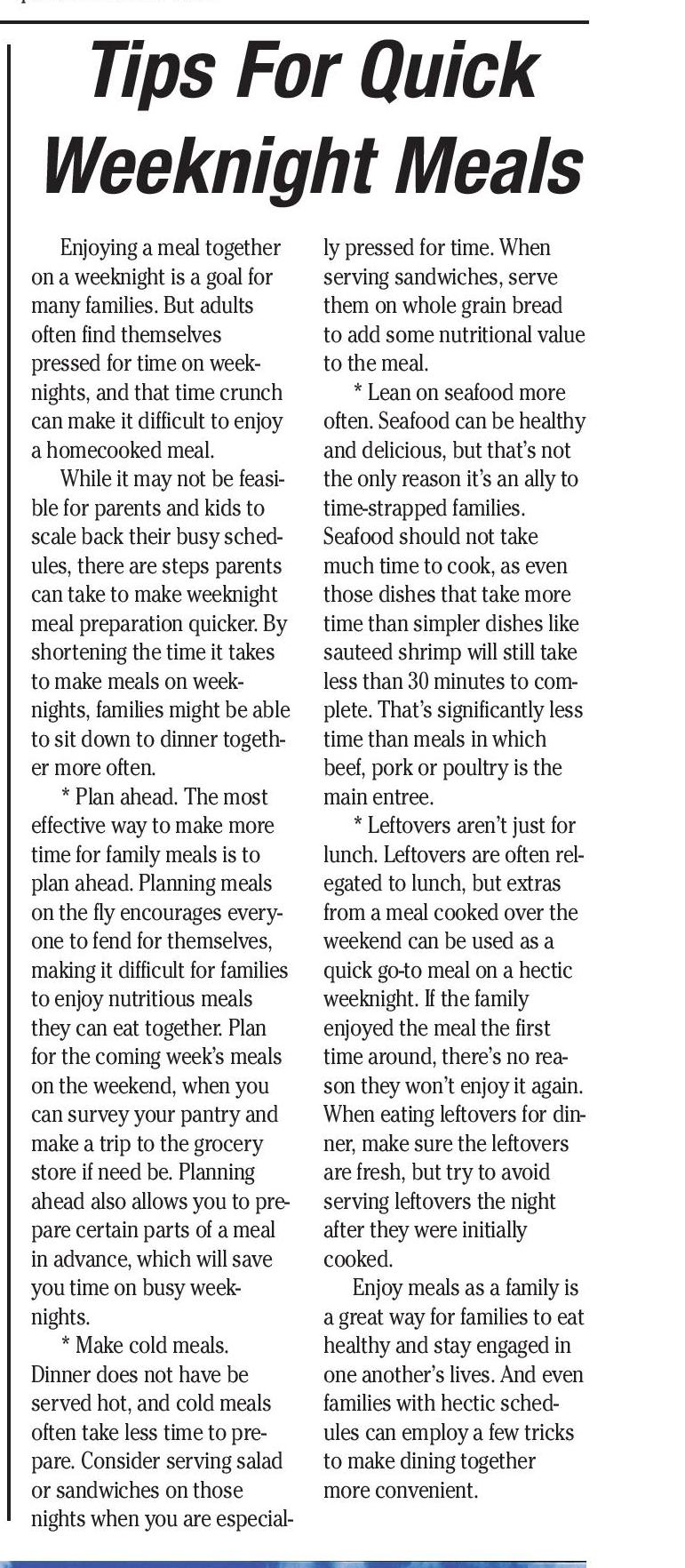072914_YKBP_A 10.pdf





10 Broadcaster Press
July 29, 2014 www.broadcasteronline.com
Parents Connecting With Social Media
There is a power outage,
and your child’s school is
dismissing students early,
requiring you to arrive
quickly for pickup. Your kid
will not be left waiting for
you because you got this
information immediately
after a quick log-in to the
social media site you use to
connect with other parents.
Some other parents may be
delayed in receiving this
important information
because they rely on phone
alerts.
Social media has changed
the way people communicate. Whether through
tweets or status updates,
information shared through
social media avenues is
often instantaneous and can
reach a large number of peo-
ple, which is why many parents have turned to social
media to learn about events
at school.
According to a study by
Nielsen McKinsey Company,
parents are more likely than
adults without children to
play games, engage in creative pursuits, and look for
entertainment on Facebook,
blogs and other social sites.
The data collected from
2,000 adults (both parents
and nonparents) who frequently use social media
found 88 percent of users
rely on social networking
sites for communicating
with family and friends. The
next most popular activity is
connecting with new friends,
followed by accessing product reviews and online
entertainment. Reports
show that adults devote a
quarter of their time spent
online to social media sites.
Parents, in particular, are
finding new ways to put
these sites to use.
Social media is helping
parents in a variety of ways,
even enabling them to keep
an eye on their children
when they go online.
According to a survey from
Laptop magazine, 55 percent
of parents are using social
media to watch their kids’
online activities. Of that 55
percent, one-fifth indicated
they only use social media
to monitor their child’s
online activity.
However, social media
has other handy purposes.
Many parents use it as they
would a bulletin board —
posting all types of information. Some parents use
social media to stay abreast
of school happenings, asking
questions about when
fundraiser money is due or if
anyone got the spelling
words for the week. Others
find it is a good way to meet
parents or speak with the
parents of their child’s classmates. Some moms and
dads use it to set up parents’ nights out, advertise
things for sale or ask for recommendations on contractors.
Parents also use social
media to invite people to
special events, including
birthday parties. Others can
see who was invited and
decide if they’re going to
come, too.
More parents are turning
to social media sites for
advice and information, to
stay in touch or simply to
share a good laugh.
Tips For Quick
Banish Bad Bedtime Behavior
Weeknight Meals
pace for happy kids
who are sleepy
when they should
be. Their bodies will
adjust to the schedule, and over time
they will involuntarily become tired
when the time is
right.
Over-stimulation
Children have
many more toys and
recreational activities at their disposal
than their parents
and grandparents
did when they were
children. The presSome parents believe sleep problems only occur during
ence of these devices,
infancy. But sleep problems may continue throughout
including video game
childhood if they are not addressed promptly.
consoles and personAs much as parents may anticipate
al tablet computers, may not make for an
their childrens’ bedtime as a point in the
ideal sleep environment. Sleep therapists
day when they can finally enjoy some
advise that television watching and activipeace and quiet, there are those moms
ties that engage the mind a good deal
and dads who dread bedtime, which can
should be ceased prior to bed and
be frustrating for even the most levelreplaced with more relaxing activities.
headed parents. Parents may face a host
This can include listening to soothing
of issues at bedtime each night, but each
music or reading a few pages of a favorite
requires patience and perseverance so
story. Avoid activities that will increase
bad behaviors can be broken once and
energy levels, such as exercise or roughfor all.
housing, before bed.
Wired Children
What parent hasn’t experienced a
child who is too excited to go to bed?
Experts say that, depending on their age,
children need 9 to 11 hours of sleep
every night. Most children should be in
bed by 8 p.m. to get the sleep their bodies need. If you miss the window of time
to get them in bed, you may enter the
overtired and wired period. A consistent
bedtime and wake time can help set the
The Bed Hog
There are plenty of parents who
embrace the concept of the “family bed,”
where everyone sleeps comfortably
together. However, those who want their
beds to be their private domain may be
put off and disturbed by small feet kicking them in the night. But when faced
with a midnight temper tantrum, many
parents relent and let their child climb
into their bed. This can cause a pattern of
behavior that is difficult to break.
Sleep training involves getting toddlers or older children accustomed to
sleeping in their own beds again. It may
begin by a parent “camping out” in the
child’s room to provide security. Over a
period of days, the parent gradually
moves closer to the door and then out of
the room entirely once the child can comfortably sleep solo in his or her room.
Initially, the process may be uncomfortable for kids and parents alike. But eventually it may solidify good sleeping
habits.
Inconsistency
A routine lets children known when it
is time to go to sleep. Lacking a consistent schedule may not provide the physical cues that it is time to go to bed.
Adhere to a routine each and every night
so children become trained to go to bed
at a particular time. This routine may
include brushing teeth, picking out pajamas and then snuggling together for a
few minutes. Children are creatures of
habit, and knowing what to expect will
help set them up for sleeping success.
Safety Issues
Some parents cannot get a good
night’s sleep because they worry about
their children rising in the middle of the
night and wandering the house unattended or even leaving the home.
Childproofing the home can calm those
concerns. Placing a secure gate at the
doorway of the child’s room can limit
roaming, while alarms placed on doors
and windows can alert parents if a child
is trying to open a window or exit the
home.
Parents can take many steps to fix
problematic bedtime behaviors and
ensure the entire household gets the
sleep they need.
Enjoying a meal together
on a weeknight is a goal for
many families. But adults
often find themselves
pressed for time on weeknights, and that time crunch
can make it difficult to enjoy
a homecooked meal.
While it may not be feasible for parents and kids to
scale back their busy schedules, there are steps parents
can take to make weeknight
meal preparation quicker. By
shortening the time it takes
to make meals on weeknights, families might be able
to sit down to dinner together more often.
* Plan ahead. The most
effective way to make more
time for family meals is to
plan ahead. Planning meals
on the fly encourages everyone to fend for themselves,
making it difficult for families
to enjoy nutritious meals
they can eat together. Plan
for the coming week’s meals
on the weekend, when you
can survey your pantry and
make a trip to the grocery
store if need be. Planning
ahead also allows you to prepare certain parts of a meal
in advance, which will save
you time on busy weeknights.
* Make cold meals.
Dinner does not have be
served hot, and cold meals
often take less time to prepare. Consider serving salad
or sandwiches on those
nights when you are especial-
ly pressed for time. When
serving sandwiches, serve
them on whole grain bread
to add some nutritional value
to the meal.
* Lean on seafood more
often. Seafood can be healthy
and delicious, but that’s not
the only reason it’s an ally to
time-strapped families.
Seafood should not take
much time to cook, as even
those dishes that take more
time than simpler dishes like
sauteed shrimp will still take
less than 30 minutes to complete. That’s significantly less
time than meals in which
beef, pork or poultry is the
main entree.
* Leftovers aren’t just for
lunch. Leftovers are often relegated to lunch, but extras
from a meal cooked over the
weekend can be used as a
quick go-to meal on a hectic
weeknight. If the family
enjoyed the meal the first
time around, there’s no reason they won’t enjoy it again.
When eating leftovers for dinner, make sure the leftovers
are fresh, but try to avoid
serving leftovers the night
after they were initially
cooked.
Enjoy meals as a family is
a great way for families to eat
healthy and stay engaged in
one another’s lives. And even
families with hectic schedules can employ a few tricks
to make dining together
more convenient.
Weekly Specials Bright Smiles for Their Bright Future
Tuesday
KNUTSON
FAMILY DENTISTRY
All-You-Can-Eat Spaghetti
4pm - Close
Served with garlic bread
$5.99 without meatballs
$6.99 with meatballs
Dr. Richard Knutson • Dr. Matthew Knutson
Cosmetic • Implants • General Practice • Single Visit Crowns
ts Children In isalign
h l r n Invisalign
nvis g
nv
Braces for Adults & Children • Invisa ign
Wednesday
Kids Eat Free
HOURS: Monday - Friday, 8:30 - 5:30
1714 East Cherry Street, Vermillion
(9 & under with the purchase of an adult meal)
Thursday
Kids Eat Free
(9 & under with the purchase of an adult meal)
Open Mic Night!
20% off all Taps
13 W Main, Vermillion
605-624-9696
Over 100 Varieties of Beer Available
605-624-6291






















 Previous Page
Previous Page






